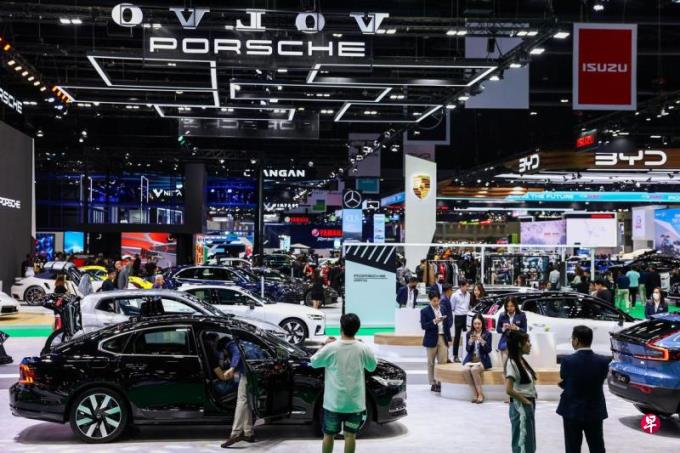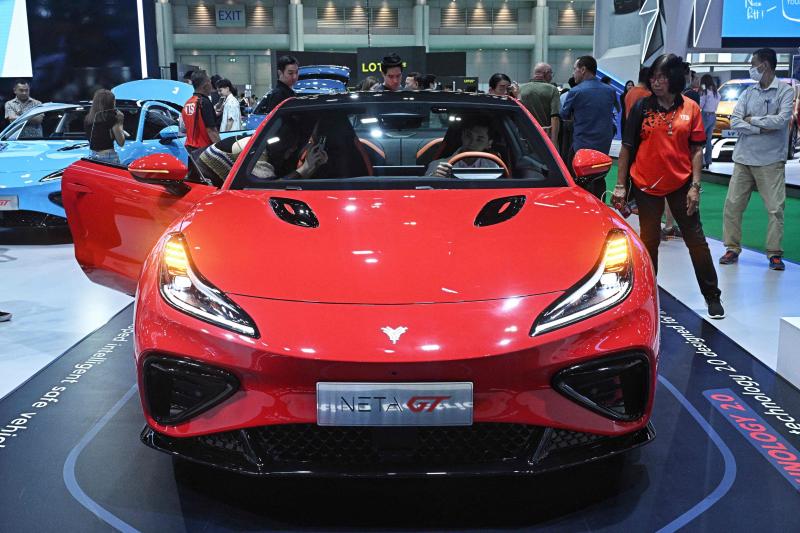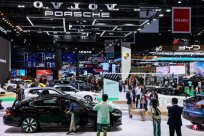
(Bangkok Peng Bodian) At the Thailand Bangkok International Auto Show held last month, a senior executive of China Hezhong New Energy Automobile Company made a strong word -this year's sales in Thailand will be over to 30,000 vehiclesEssence
The electric car brand of Hezhong Automobile is called Neta. With streamlined fashion design, 105,563 Nezha electric vehicles are sold worldwide.In addition to small car companies such as Hezhong Automobile, there are also leading electric car companies like BYD, with annual sales of more than 3 million units worldwide, and the price of low -cost hatchback electric vehicles is only 10,000 US dollars (about 13,500 new.Yuan) around.
Traditional Japanese car companies do not have the same type of electric vehicle products that can compete with Chinese new energy vehicles, and the electric vehicle market in many places can only be beaten.In Thailand, the market share of Japanese car companies fell 8.2 percentage points last year. It has dropped to less than 80%for the first time in many years, and the market share of Chinese cars has reached 10%.
Hezhong Automobile originally planned to double the output of Thai factories within five years, but Vice President Wang Chengjie said: "I don't need to wait for five years. This goal will be achieved soon."
The Thai automobile market has sold 800,000 units an annual sales. Last year, electric vehicles were sold for 76,000 vehicles. Hezhong Automobile had an annual sales of 30,000 electric vehicles, not a small number.
Chinese new energy vehicle companies like Hezhong Automobile are based on Thailand and set their eyes to a wider range of Southeast Asian automobile markets.

According to statistics from the Japanese trade revitalization agency, the sales and registration volume of new cars in the Asian Guoan country increased by 18%to 3.27 million in 2022, making Asianian one of the world's largest automotive market, second only to the fourth global rankingJapan and the fifth -ranked German.
Thailand has benefited from the industrial supply chain established by Japanese car companies for internal combustion engine vehicles. It has developed into the largest automobile manufacturing center in Southeast Asia, and has the reputation of "Detroit Asia".This attracted electric vehicle manufacturers such as BYD and Great Wall Motors to invest in Thailand to make good use of local mature labor teams and supply chains.
Chinese car dealers have not only established factories in Thailand, but also exported a record new energy vehicle to Thailand and other countries. China has surpassed Japan to become the world's largest exporter in the world.
Miya Najian, an analyst of Karnorama, a Japanese car information company, said that from the perspective of changes in the automotive market in Thailand and other countries in the region, "Japanese car dealers cannot be complacent."
According to Bloomberg New Energy Finance, although electric vehicles accounted for only 1%of Southeast Asian passenger car sales in 2020, this number will reach 14%in 2030, and it may reach 64%in 2040.
However, Japanese car companies are not beaten.Considering the demand for pickup trucks in Thais, Toyota announced that it plans to launch an electric version of the Hilux pickup in Thailand at the end of 2025. Kuibu also released the first electric version of Picca D-MAX at the Bangkok International Auto Show.
Thailand is a big agricultural country, and pickup trucks account for 40 % of the sales of new cars, so the pickup truck market is a must -have for soldiers.Who is the time to compete in Thailand to compete in Thailand, it still takes time to answer.




